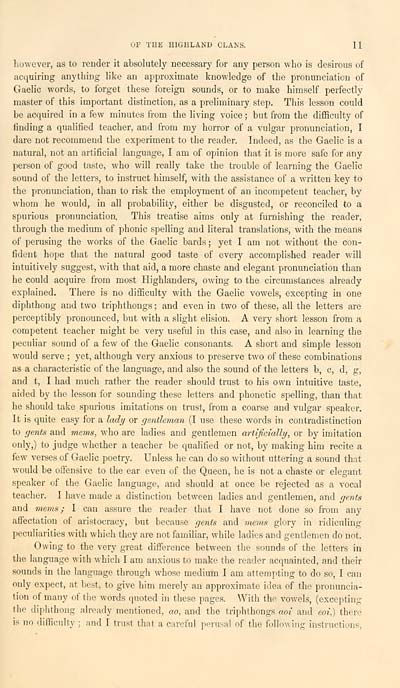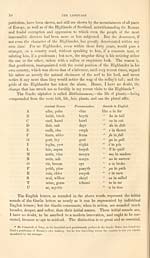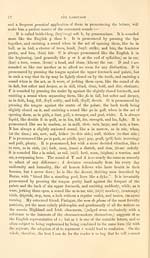Download files
Complete book:
Individual page:
Thumbnail gallery: Grid view | List view

OF TUE UIGHLAND CLANS. 11
liowever, as to render it absolutely necessar3' for any person who is desirous of
acquiring anything like an approximate knowledge of the pronunciation of
Gaelic words, to forget these foreign sounds, or to make himself perfectly
master of this important distinction, as a preliminary step. This lesson could
be acquired in a few minutes from the living voice ; but from the diiBculty of
finding a qualified teacher, and from my horror of a vulgar pronunciation, I
dare not recommend the experiment to the reader. Indeed, as the Gaelic is a
natural, not an artificial language, I am of opinion that it is more safe for any
person of good taste, who will really take the trouble of learning the Gaelic
sound of the letters, to instruct himself, with the assistance of a written key to
the pronunciation, than to risk the employment of an incompetent teacher, by
whom he would, in all probability, either be disgusted, or reconciled to a
spurious pronunciation. This treatise aims only at furnishing the reader,
through the medium of phonic spelling and literal translations, with the means
of perusing the works of the Gaelic bards ; yet I am not without the con-
fident hope that the natural good t<aste of every accomplished reader will
intuitively suggest, with that aid, a more chaste and elegant pronunciation than
he could acquire from most Highlanders, owing to the circumstances already
explained. There is no difficulty with the Gaelic vowels, excepting in one
diphthong and two triphthongs ; and even in two of these, all the letters are
perceptibly pronounced, but with a slight elision. A very short lesson from a
competent teacher might be very useful in this case, and also in learning the
peculiar sound of a few of the Gaelic consonants. A short and simple lesson
would serve ; yet, although very anxious to preserve two of these combinations
as a characteristic of the language, and also the sound of the letters b, c, d, g,
and t, I had much rather the reader should trust to his own intuitive taste,
aided by the lesson for sounding these letters and phonetic spelling, than that
he should take spurious imitations on trust, from a coarse and vulgar speaker.
It is quite easy for a lady or gentleman (I use these words in contradistinction
to fjents and mems, who are ladies and gentlemen artificially, or by imitation
only,) to judge whether a teacher be qualified or not, by making him recite a
few verses of Gaelic poetry. Unless he can do so without uttering a sound that
would be offensive to the ear even of the Queen, he is not a chaste or elegant
speaker of the Gaelic language, and should at once be rejected as a vocal
teacher. I have made a distinction between ladies and gentlemen, and gents
and mems; I can assure the reader that I have not done so from any
affectation of aristocracy, but because gents and mems glory in ridiculing
peculiarities with which they are not familiar, while ladies and gentlemen do not.
Owing to the very great difference between the sounds of the letters in
the language with which I am anxious to make the reader acquainted, and their
sounds in the language through whose medium I am attempting to do so, I can
only expect, at best, to give him merely an approximate idea of the pronuncia-
tion of many of the words quoted in these pages. With the vowels, (excepting
the diphthong already mentioned, ao, and the triphthongs aoi and eoi,) there
is no difficulty ; and I trust that a careful perusal of the following instructions,
liowever, as to render it absolutely necessar3' for any person who is desirous of
acquiring anything like an approximate knowledge of the pronunciation of
Gaelic words, to forget these foreign sounds, or to make himself perfectly
master of this important distinction, as a preliminary step. This lesson could
be acquired in a few minutes from the living voice ; but from the diiBculty of
finding a qualified teacher, and from my horror of a vulgar pronunciation, I
dare not recommend the experiment to the reader. Indeed, as the Gaelic is a
natural, not an artificial language, I am of opinion that it is more safe for any
person of good taste, who will really take the trouble of learning the Gaelic
sound of the letters, to instruct himself, with the assistance of a written key to
the pronunciation, than to risk the employment of an incompetent teacher, by
whom he would, in all probability, either be disgusted, or reconciled to a
spurious pronunciation. This treatise aims only at furnishing the reader,
through the medium of phonic spelling and literal translations, with the means
of perusing the works of the Gaelic bards ; yet I am not without the con-
fident hope that the natural good t<aste of every accomplished reader will
intuitively suggest, with that aid, a more chaste and elegant pronunciation than
he could acquire from most Highlanders, owing to the circumstances already
explained. There is no difficulty with the Gaelic vowels, excepting in one
diphthong and two triphthongs ; and even in two of these, all the letters are
perceptibly pronounced, but with a slight elision. A very short lesson from a
competent teacher might be very useful in this case, and also in learning the
peculiar sound of a few of the Gaelic consonants. A short and simple lesson
would serve ; yet, although very anxious to preserve two of these combinations
as a characteristic of the language, and also the sound of the letters b, c, d, g,
and t, I had much rather the reader should trust to his own intuitive taste,
aided by the lesson for sounding these letters and phonetic spelling, than that
he should take spurious imitations on trust, from a coarse and vulgar speaker.
It is quite easy for a lady or gentleman (I use these words in contradistinction
to fjents and mems, who are ladies and gentlemen artificially, or by imitation
only,) to judge whether a teacher be qualified or not, by making him recite a
few verses of Gaelic poetry. Unless he can do so without uttering a sound that
would be offensive to the ear even of the Queen, he is not a chaste or elegant
speaker of the Gaelic language, and should at once be rejected as a vocal
teacher. I have made a distinction between ladies and gentlemen, and gents
and mems; I can assure the reader that I have not done so from any
affectation of aristocracy, but because gents and mems glory in ridiculing
peculiarities with which they are not familiar, while ladies and gentlemen do not.
Owing to the very great difference between the sounds of the letters in
the language with which I am anxious to make the reader acquainted, and their
sounds in the language through whose medium I am attempting to do so, I can
only expect, at best, to give him merely an approximate idea of the pronuncia-
tion of many of the words quoted in these pages. With the vowels, (excepting
the diphthong already mentioned, ao, and the triphthongs aoi and eoi,) there
is no difficulty ; and I trust that a careful perusal of the following instructions,
Set display mode to: Large image | Transcription
Images and transcriptions on this page, including medium image downloads, may be used under the Creative Commons Attribution 4.0 International Licence unless otherwise stated. ![]()
| Early Gaelic Book Collections > Blair Collection > Treatise on the language, poetry, and music of the Highland clans > (23) |
|---|
| Permanent URL | https://digital.nls.uk/76236656 |
|---|
| Description | A selection of books from a collection of more than 500 titles, mostly on religious and literary topics. Also includes some material dealing with other Celtic languages and societies. Collection created towards the end of the 19th century by Lady Evelyn Stewart Murray. |
|---|
| Description | Selected items from five 'Special and Named Printed Collections'. Includes books in Gaelic and other Celtic languages, works about the Gaels, their languages, literature, culture and history. |
|---|

